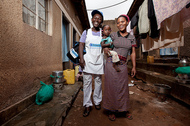 Many of the critical economic issues of our time were front and center at the World Economic Forum in Davos last week. But too many of the conversations overlooked what's happening in the bustling slums and remote villages of the developing world, where the benefits of better growth are most needed.
Many of the critical economic issues of our time were front and center at the World Economic Forum in Davos last week. But too many of the conversations overlooked what's happening in the bustling slums and remote villages of the developing world, where the benefits of better growth are most needed.
And what's happening is this: a riveting convergence of microfinance, direct selling, mobile technology and social media that has the power to bring the work of local entrepreneurs to new heights. Together, they stand to not only create livelihoods but also make a difference in the lives of customers all across the developing world and expand markets for global brands.
It couldn't come at a better time. The situation for entrepreneurs and their would-be customers remains dire for the majority of the planet. Over a third of the globe is underemployed, with that number even higher in countries like India, Nigeria, South Africa and Indonesia. Many who do work are entrepreneurs by necessity, making just enough to scrape by but not enough to build better lives for themselves and their families.
All the while hundreds of millions lack access to life-changing products like fortified foods, electricity, clean cook stoves, clean cooking fuels and clean water. In the last 10 years innovators have created dozens of products to meet these vital needs -- products that offer compelling health benefits and significant savings. Yet these remain out of reach to millions. Why? Fragmented distribution plays a key role. But with the convergence of these four forces, local entrepreneurs could turn the status quo on its head. Here's how:
1) Microfinance. In the last 30 years microfinance has grown from a fringe social experiment to a global business bringing financial services to half a billion previously unbanked people. Smart microcredit programs allow organizations to give low-interest credit to entrepreneurs so they can grow their businesses. They also allow entrepreneurs to offer credit to their customers -- a game-changer in markets where cash flow constraints are one of the major limitations to the penetration of pro-poor products.
2) Direct selling. Direct selling exploits one the most powerful forces in markets and societies -- the power of human networks. As one of the fastest growing consumer business models, it saw close to 6 percent growth in 2012 (up to $166 billion annually) and is now growing faster than traditional fast moving consumer goods companies like Unilever, P&G and Nestlé. Franchised direct selling lowers risks and increases profits for franchisors, franchisees and lenders -- a necessity in these volatile markets.
3) Mobile technology. Every year the penetration of mobile phones increases faster than we predicted, with penetration in Africa already at 80 percent today. Mobile phones help entrepreneurs extend their reach, lower their cost of marketing products and respond immediately to customer needs anywhere. What's more, mobile money is quickly becoming a game changer for consumers and retailers alike. In 2005, three percent of Kenya's GDP was transferred with mobile money. By 2013, that number was up to 31 percent.
4) Social Media. Franchised micro-entrepreneurs use their existing social networks to succeed. That's how agents at Avon, Tupperware and other great direct selling brands became successful. But today, online social networks stand to enhance this phenomenon and bring communities closer. Mxit in South Africa alone has 6.5m users, and Facebook has over 50m across the Africa. Communities are beginning to digitize and share their lives online, giving entrepreneurs the opportunity to increase their marketing power and customer service prowess.
Back in the town of Masaka, Uganda, Living Goods agent Sissy Nansubuga is already empowered by these converging forces. As a franchised direct seller, she uses her social network to find customers for products that improve the health and wealth of her community, from medicines to solar lamps to fortified foods. She uses an established credit system to buy her goods, then extends that credit to her poor clients. Using mobile, she logs customer interactions, markets products, and provides 24/7 customer service to her clients.
Sissy is not alone. The billions of underemployed people in emerging markets have the capacity to be resourceful entrepreneurs. If we put these powerful tools in their hands we can level the playing field, creating millions of high profit, high impact jobs that make a profound difference in the lives of poor consumers everywhere.
Photo credit: Esther Havens
Follow Chuck Slaughter and Living Goods on Twitter @Living_Goods